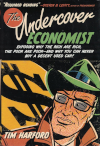16 November 2025
The Undercover Economist
Economics - 2005
⭐⭐⭐⭐
The Undercover Economist does a good job of explaining basic economics in a way that is clear for those without much background but not boring for those who know more about it.
What really stood out for me in this book was the quality of the examples. The author talks about why being a coffee farmer isn't a great job, the problems with various health care systems, and China's rise, among other things. Even if you've studied some econ, these stories, plus the very accessible style, make the book really interesting.
Another cool thing is that he talks about personal experiences, like going to Cameroon to find out why it is poor. Of course, we've all heard reasons for why some group of people is poor, but his version (that the government is screwed up and is prioritizing all kinds of unhelpful things, because they are essentially bandits) jibed with my brief experience in West Africa. Not only that, but he took the time to explain why the bandits weren't doing a good job at governing.
Now, of course, it is always useful to know about economics, but it is especially nice to learn something that is potentially useful. Some of the ideas he talks about he then used to give really concrete info, like how to evaluate when a business really has an advantage that makes it worth it to buy some stock.
Overall, I found that a lot of the ideas in the book were things I probably should have known in theory but were presented in such a clear way that I came away with a much better idea overall of how things work.
I will absolutely read another of his books. Would I reread this one? Maybe. Rather than going through the whole book, I could totally see myself rereading sections, since there are definitely bits I'll want to know better at some point.
Should you read this? First, are you interested in getting a more clear idea of how the world works? If so, then yes. Lots of people spout crap about economics as if they know what they are talking about, but not actually that many of them do. This book would give you some perspective on that.
What really stood out for me in this book was the quality of the examples. The author talks about why being a coffee farmer isn't a great job, the problems with various health care systems, and China's rise, among other things. Even if you've studied some econ, these stories, plus the very accessible style, make the book really interesting.
Another cool thing is that he talks about personal experiences, like going to Cameroon to find out why it is poor. Of course, we've all heard reasons for why some group of people is poor, but his version (that the government is screwed up and is prioritizing all kinds of unhelpful things, because they are essentially bandits) jibed with my brief experience in West Africa. Not only that, but he took the time to explain why the bandits weren't doing a good job at governing.
Now, of course, it is always useful to know about economics, but it is especially nice to learn something that is potentially useful. Some of the ideas he talks about he then used to give really concrete info, like how to evaluate when a business really has an advantage that makes it worth it to buy some stock.
Overall, I found that a lot of the ideas in the book were things I probably should have known in theory but were presented in such a clear way that I came away with a much better idea overall of how things work.
I will absolutely read another of his books. Would I reread this one? Maybe. Rather than going through the whole book, I could totally see myself rereading sections, since there are definitely bits I'll want to know better at some point.
Should you read this? First, are you interested in getting a more clear idea of how the world works? If so, then yes. Lots of people spout crap about economics as if they know what they are talking about, but not actually that many of them do. This book would give you some perspective on that.
